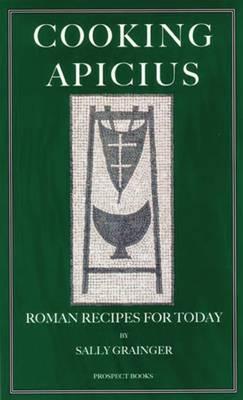
Cooking Apicius: Roman Recipes for Today
By Sally Grainger
Reviewed by Loreena Johnson
This handy little book is a stroke of genius on the publishers part. A collection
of recipes from Apicius as researched and trialled by the author ? who just
happens to be the same as co-authored Apicius ? A Critical Review. No
wading through pages of discourse, reviews and examinations of potential
influences ? just straight to the recipes.
To me, it?s not a stand-a- lone because the recipes are not accompanied by
the original text or even a translation of the original. I personally enjoy
knowing about the context a dish was created and enjoyed in. I was also a
little disappointed in the recipes selected (a solid 64 in total). They are either
totally unreproducible (due to extinction of main ingredient, ethical or safety
reasons) or what I would term ?safe? ? they will work and be very tasty (and
very accurate) but actually not very different from the flavour combinations we
are used to today.
This is a totally personal perspective ? and as a primer for someone starting
out presenting Roman style food, it is hard to go past.
[tabs] [tab title=”Publishers Content”] Sally Grainger has gathered, in one convenient volume, her modern interpretations of 64 of the recipes in the original text. This is not recipes inspired by the old Romans but rather a serious effort to convert the extremely gnomic instructions in the Latin into something that can be reproduced in the modern kitchen which actually gives some idea of what the Romans might have eaten. Sally Grainger, therefore, has taken great pains to suggest means of replicating the particular Roman taste for fermented fish sauce. It may sound unpleasant, but actually is not too far removed from the fish sauces of the Far East and any reproduction of Roman cookery must depend on getting this particular aspect right.” [/tab] [/tabs]